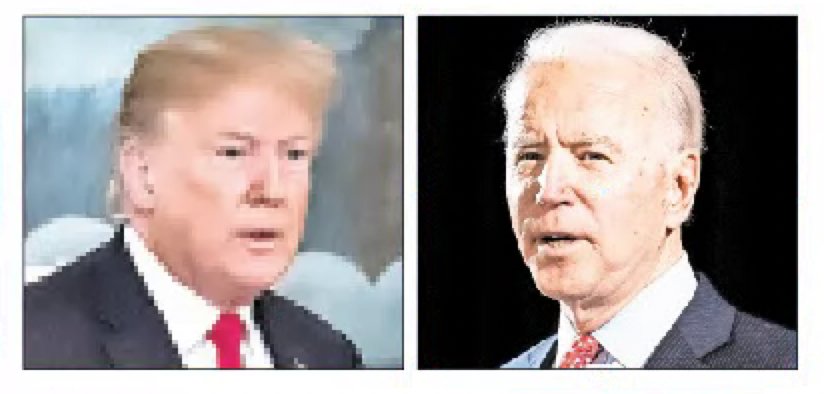Dems and Repubs target Jewish swing voters
WASHINGTON — Jewish voters can make a difference.
Take Florida: The Sunshine State’s Jewish voters helped deliver its critical electoral votes to Barack Obama in 2008 and 2012. Problematic ballots in heavily Jewish Broward County may have clinched George W. Bush’s win in 2000.
In years past I have sat among crowds rallied by Jewish campaign surrogates in packed synagogues in Ohio and bingo halls in Florida, and I’ve followed canvassers searching for mezuzahs in neighborhoods known for having large Jewish populations.
Severe limits on in-person campaigning imposed by the coronavirus pandemic means we’re not likely to be bringing you those stories this season. But a very different election year doesn’t mean the Jewish vote in swing states is less important.
This week, I asked people working to get out the Jewish vote — partisan and nonpartisan — where they’re concentrating their efforts, how much they’re planning to spend, what adjustments they’re making because of the pandemic and what is preoccupying them down-ballot. Here’s what they told me.
The Republican Jewish Coalition appears to have the most advanced operation in place. With $10 million pledged to reelect Donald Trump and secure GOP control in Congress, that may not be a surprise.
The RJC’s get-out-the-vote operation already has four workers on staff in Florida, according to Matt Brooks, its executive director, and volunteers have made 300,000 phone calls to Jewish voters in swing states — a preliminary round of phone banking where the goal is not persuasion but identification, to see how committed a voter is to reelecting Trump and what issues they are considering ahead of Election Day. This lays the ground for more calls and texts later in the season that are tailored to the individual voter.
But with Trump’s polling in freefall, the group doesn’t have that many states to direct that energy. Brooks told me his swing-state operation was focusing on Florida, Ohio, Arizona, Pennsylvania and Georgia.
“We’re monitoring and looking at and ready to pivot to see how Michigan and Wisconsin continue to shape up,” he added.
Brooks said the RJC chose those states because the vote there is “competitive.” That’s notable: Trump’s 2016 victory included narrow wins in Wisconsin, Michigan, Pennsylvania, Florida and Arizona.
Including Georgia and Ohio in the mix indicates the deep trouble Trump is in. In 2016, he won Georgia by 5 points and Ohio by 8.
From Brooks’ map it would appear that the RJC doesn’t think there’s a chance for Trump to win in Michigan or Wisconsin. Polls show Joe Biden leading Trump in both states by double digits.
Meanwhile, the Jewish Democratic Council of America has a much more expansive map. In addition to the five states the RJC is targeting, along with Michigan and Wisconsin, the JDCA says it is ready to target Jewish voters in Colorado, Maine, Minnesota, Nevada, New Hampshire, North Carolina and Virginia — a 14-state plan, as director Halie Soifer put it.
Soifer said she hoped to spend over $1 million and as much as $5 million in pushing out the vote.
“They are the states where we think the Jewish vote can make a difference in the presidential and key Senate and House elections,” she said.
JDC has organized a number of webinars, and has launched phone banking. Soifer told me she hopes to reach “hundreds of thousands, if not over a million” Jewish voters. “First it will be persuasion methods, and then get out the vote,” she said.
The political action committee associated with the Democratic Majority for Israel is planning to highlight Biden’s pro-Israel record in a digital campaign. (The RJC already launched a video, titled “Sunrise,” that calls Trump “the most pro-Israel president in history.”)
But the PAC’s emphasis will be down-ballot, Mellman said, because that’s where it makes more sense to spend money; both presidential campaigns have plenty of resources already. The messaging down-ballot will not necessarily be about Israel, he said, but about issues of importance to local voters.
During the primaries, the PAC has already run ads targeting opponents of its favored candidates on themes that have nothing to do with Israel. Its $1.5 million spent to unsuccessfully protect veteran Riverdale Rep. Eliot Engel included ads raising the fact that his challenger, Jamaal Bowman, had an unpaid tax bill.
Mark Mellman, the Democratic Majority for Israel’s president and CEO, has proven to be a prodigious fundraiser and said his group would be spending in the millions of dollars in a broad campaign. (He declined to be more specific on the amount.)
“We will be on TV, we will be in the mail, we will be on the telephone, we will be digital,” he said. “We will be in every form of communication known to human beings.”
When it comes to the Senate, Republicans have 23 seats up for reelection, while the Democrats have only 12. That means Republican Jewish groups must be on the defensive, especially as Trump’s sinking popularity threatens to derail down-ballot Republicans, while Democratic groups can focus on flipping seats.
This week, the Jewish Democratic Council of America added 17 names to its congressional endorsements, bringing the total to 89. Significantly, most of the new batch is challenging Republicans in states that Trump won in 2016, including Ohio, Georgia, Missouri, Pennsylvania, Wisconsin, Alaska, South Carolina and Tennessee. Among the 17 are four Senate candidates — Jon Ossoff in Georgia, James Mackler in Tennessee, Al Gross in Alaska and Jaime Harrison in South Carolina — challenging incumbent Republicans. Ossoff, Mackler and Gross are Jewish.

 39.0°,
Fair
39.0°,
Fair 




